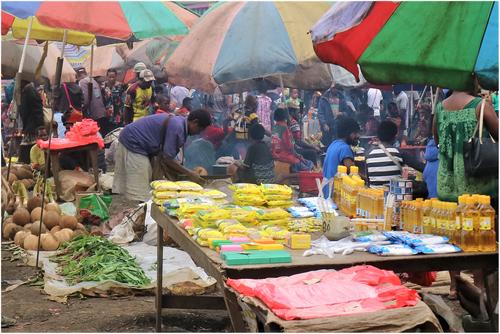市场更新:六十年来巴布亚新几内亚新鲜食品市场的变化
IF 0.8
3区 社会学
Q1 AREA STUDIES
引用次数: 1
摘要
露天市场对巴布亚新几内亚的粮食安全、生计和国民经济至关重要。在过去的60年里,城市人口的快速增长、全球商品价格的变化以及巴布亚新几内亚货币的贬值刺激了对国内新鲜食品的需求。在市场上出售新鲜食品也成为农村生产者和城市居民赚钱的一种有吸引力的方式,农村生产者的出口作物的劳动力回报已经下降,城市居民也在努力谋生。这反过来又导致了巴布亚新几内亚市场的重大变化:空间和时间的变化,买卖的变化,卖家的变化,以及食品交易方式的变化。在本文中,我们汇集了1961年至2022年间巴布亚新几内亚市场的研究,以记录这些变化及其原因,以及重要的连续性,并检查其影响和我们知识中的实质性差距。本文章由计算机程序翻译,如有差异,请以英文原文为准。

Market update: Sixty years of change in Papua New Guineaʼs fresh food marketplaces
Open‐air marketplaces are vital to food security, livelihoods, and the national economy in Papua New Guinea (PNG). Over the past 60 years, rapid growth of urban populations, changes in global commodity prices, and the decline in value of the PNG currency have stimulated demand for domestic fresh food. Selling fresh food in marketplaces has also become an attractive way to earn money for rural producers, whose returns on labour on their export crops have declined, and for urban residents struggling to make a living. This in turn has led to significant changes in PNGʼs marketplaces: spatial and temporal changes, changes in what is bought and sold, changes in who is selling, and changes in how food is transacted. In this paper, we bring together research on PNGʼs marketplaces from between 1961 and 2022 to document these changes and their causes, alongside important continuities, and to examine the implications and substantial gaps in our knowledge.
求助全文
通过发布文献求助,成功后即可免费获取论文全文。
去求助
来源期刊

Asia & the Pacific Policy Studies
AREA STUDIES-
CiteScore
3.20
自引率
5.30%
发文量
19
审稿时长
6 weeks
期刊介绍:
Asia & the Pacific Policy Studies is the flagship journal of the Crawford School of Public Policy at The Australian National University. It is a peer-reviewed journal that targets research in policy studies in Australia, Asia and the Pacific, across a discipline focus that includes economics, political science, governance, development and the environment. Specific themes of recent interest include health and education, aid, migration, inequality, poverty reduction, energy, climate and the environment, food policy, public administration, the role of the private sector in public policy, trade, foreign policy, natural resource management and development policy. Papers on a range of topics that speak to various disciplines, the region and policy makers are encouraged. The goal of the journal is to break down barriers across disciplines, and generate policy impact. Submissions will be reviewed on the basis of content, policy relevance and readability.
 求助内容:
求助内容: 应助结果提醒方式:
应助结果提醒方式:


